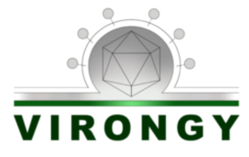 After making striking advancements in HIV and COVID-19 research, Virongy, a biotechnology company in Prince William County, Virginia, has set its sight on tackling even more viruses. With millions of people being afflicted by viral illnesses worldwide each year, Virongy’s objective addresses an ever-increasing market need.
After making striking advancements in HIV and COVID-19 research, Virongy, a biotechnology company in Prince William County, Virginia, has set its sight on tackling even more viruses. With millions of people being afflicted by viral illnesses worldwide each year, Virongy’s objective addresses an ever-increasing market need.
“Our goal is to create advanced diagnostics so that doctors can promptly prescribe treatments to patients,” said Brian Hetrick, chief scientific officer of Virongy.
The Virongy team also works beyond the walls of their commercial lab, leveraging the unique infectious disease research capabilities offered by George Mason University’s Biomedical Research Laboratory on the Science and Technology Campus. This state-of-the-art building, where studies can be conducted safely and in compliance with Centers for Disease Control and Prevention regulations, provides an ideal place for them to work on Biosafety Level 3 (BSL3) pathogens. Pathogens investigated in a BSL3 laboratory have the potential to cause serious or potentially lethal disease through respiratory transmission.
Yuntao Wu, a professor in the College of Science (COS) and a member of the Institute for Biohealth Innovation at Mason, founded Virongy in 2013. The biotech company was formed after Wu licensed an HIV drug-screening technology that was developed in his Mason lab. From there, he was able to set up his new company at the Prince William County Science Accelerator, a life sciences startup incubation facility.
“Virongy’s success in addressing worldwide pervasive viruses such as HIV and COVID-19, and now its move to expand its scope to a larger variety of diseases, is an achievement we are immensely proud of here at Mason,” said COS Dean Fernando Miralles-Wilhelm.
Recognizing the technology’s tremendous potential, angel investors and venture capitalists sought out Virongy for investment. The company also has been the recipient of multiple nondilutive grants, including a Prince William County Department of Economic Development (PWCDED)’s IGNITE program grant and a Small Business Innovation Research (SBIR) grant through the National Institutes of Health. With its rapid growth, Wu knew Virongy needed more space.
The opening of the Northern Virginia Bioscience Center, a 30,000-square-foot wet lab building managed by Holladay Properties with sophisticated equipment funded by GO Virginia, brought Wu his answer. The Biohealth Capital Region, comprising Virginia, Maryland, and Washington D.C., is the fourth-ranked biopharma cluster in the United States, as reported by Genetic Engineering and Biotechnology News. The region’s high concentration of talent in the health care sector meant that additional commercial wet lab space was a necessity.
“Disruption is always an opportunity for innovation, and our life sciences sector in Prince William County expanded exponentially during the pandemic,” said Christina Winn, executive director of the PWCDED. “Virongy’s expansion is a combination of exciting technology from Dr. Wu with the addition of expert business staff and the lab space to grow right here in Innovation Park.”
The launching of the bioscience center allowed Virongy to move from a 600-square-foot space to a 1,600-square-foot lab. Both Wu and Hetrick are excited about the opportunities that come with the expansion.
“Not only can we bolster our research capabilities, but we also aim to be a supplier of new jobs in the area,” said Hetrick, who holds a PhD in biosciences from Mason.
In addition, Virongy is one of the life science companies that is part of the Northern Virginia BioHub, which was recently established through Virgina Bio-Connect and funded by a $3.2 million GO Virginia matching grant. Susan Baker, managing director of GO Virginia’s Region 7, sees the grant as money well-invested.
